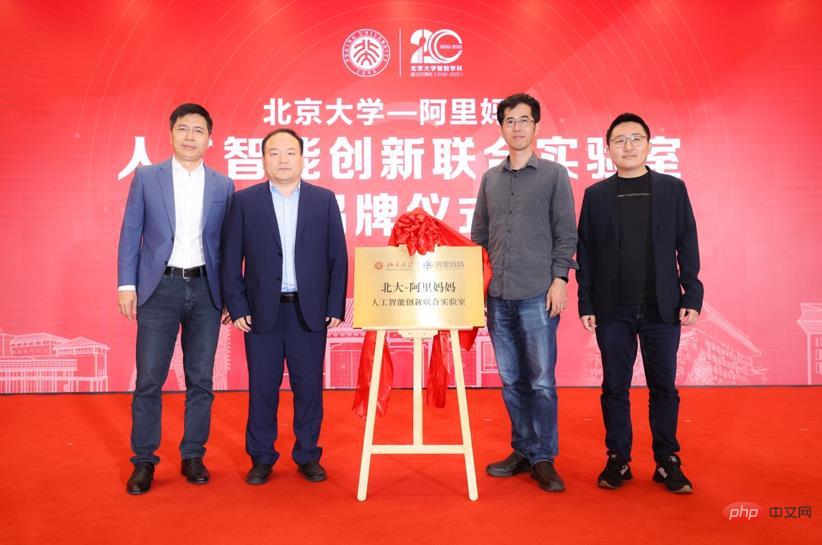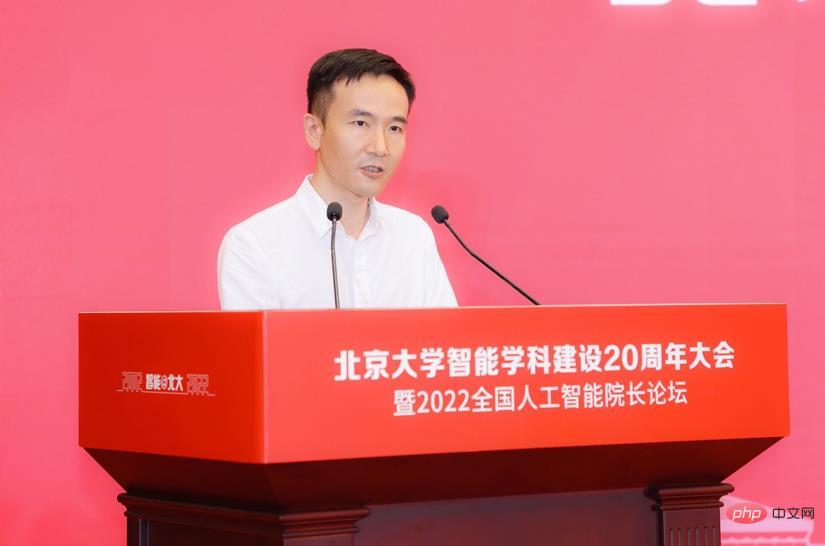Home >Technology peripherals >AI >Peking University and Alibaba establish joint laboratory to focus on artificial intelligence theory and innovative algorithm research
Peking University and Alibaba establish joint laboratory to focus on artificial intelligence theory and innovative algorithm research
- 王林forward
- 2023-04-12 19:55:041802browse
On September 17, at the 20th anniversary conference of Peking University’s intelligent discipline construction, Peking University and Alibaba jointly announced the establishment of the “Peking University-Alimama Artificial Intelligence Innovation Joint Laboratory” (hereinafter referred to as the laboratory). The laboratory will focus on research on theories, methods and key technologies in the cutting-edge field of artificial intelligence to bring world-leading innovation results to society and enterprises.

Peking University-Alimama Artificial Intelligence Innovation Joint Laboratory was established
Peking University is the founder and leader of China's intelligent disciplines In 2002, he founded the first Department of Intelligent Science in China, cultivating a large number of artificial intelligence talents for society. As one of the companies with the most comprehensive artificial intelligence technology layout, Alibaba has many achievements in graph neural networks, multi-modal large models, NLP, and visual technology. Its subsidiary Alimama is one of the largest practitioners of intelligent search recommendations. The laboratory will leverage the strengths of both parties in basic research and large-scale business scenario practice. The first phase has already launched research work in areas including large-scale graph pre-training models, decision-making intelligence, and intelligent music generation.
The laboratory is led by Professor Zhu Songchun, dean of the School of Intelligence at Peking University, dean of the Institute of Artificial Intelligence, and a well-known scholar in the field of international artificial intelligence. It is also composed of academic members such as Deng Xiaotie, a foreign academician of the European Academy of Sciences and chair professor of Peking University. The steering group also participated in the construction. Song Guojie, associate professor and assistant to the dean of Peking University School of Intelligence, and Zheng Bo, technical director of Alimama, served as co-directors.
Zhu Songchun said: "The joint laboratory should anchor the most cutting-edge international artificial intelligence development trends, face the major needs of national economic development, and boldly explore in cutting-edge directions such as general artificial intelligence, the metaverse, and digital humans. Pay attention to the intersection and integration of multiple disciplines, explore a development path with Chinese characteristics and reflect Chinese wisdom, and contribute to the country’s artificial intelligence development strategy."
Alibaba Cheng Li, chief technology officer of the group, said: "Alibaba and Peking University have a long history of cooperation. The establishment of the Peking University-Alimama Artificial Intelligence Innovation Joint Laboratory marks a new stage of cooperation between the two parties. In the future, the laboratory will become a new Samples of industry-university-research cooperation to create good technologies that benefit both enterprises and consumers in important research fields and core industrial scenarios."

Ali Cheng Li, Chief Technology Officer of Baba Group
It is reported that the first batch of research results of the laboratory have been successfully implemented. Based on Alibaba's open source graph learning platform - Euler2.0, the research team optimized, adapted and improved the efficiency of the large-scale graph pre-training model, and for the first time realized the hierarchical graph pre-training model on industrial-grade ultra-large-scale graphs. The implementation of the training technology will effectively improve the operating efficiency of merchants. In the future, this technology will also be applied to transportation systems, molecular structure prediction, program reasoning and other fields.
Liu Bo, President of Alimama, said that Alimama’s internal business has been fully AI-based and will continue to provide technical platforms and verification scenarios for the laboratory’s technical research in the future to jointly promote commercial digital intelligence. ization process.
In the past five years, Alimama’s technical team has published more than 100 papers at top international conferences, and has open sourced DIN (Deep Interest Network), XDL (Deep Learning Framework), EULER (Distributed High Performance) to the industry Graph Representation Learning Framework) and other AI models and platforms.
The above is the detailed content of Peking University and Alibaba establish joint laboratory to focus on artificial intelligence theory and innovative algorithm research. For more information, please follow other related articles on the PHP Chinese website!
Related articles
See more- Technology trends to watch in 2023
- How Artificial Intelligence is Bringing New Everyday Work to Data Center Teams
- Can artificial intelligence or automation solve the problem of low energy efficiency in buildings?
- OpenAI co-founder interviewed by Huang Renxun: GPT-4's reasoning capabilities have not yet reached expectations
- Microsoft's Bing surpasses Google in search traffic thanks to OpenAI technology

